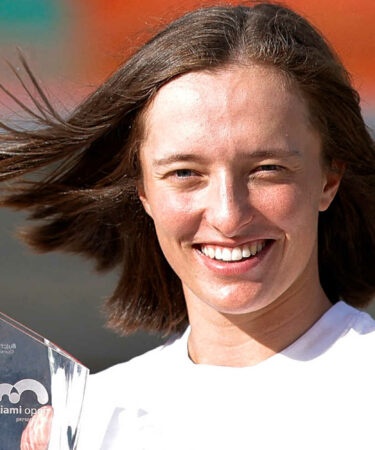Swiatek on business and bold choices: “I want to use my impact well in a way that is healthy for me”
Iga Swiatek has made historical moves on the court, and now seems to be ready to also build an off-court brand that will get her voice out.
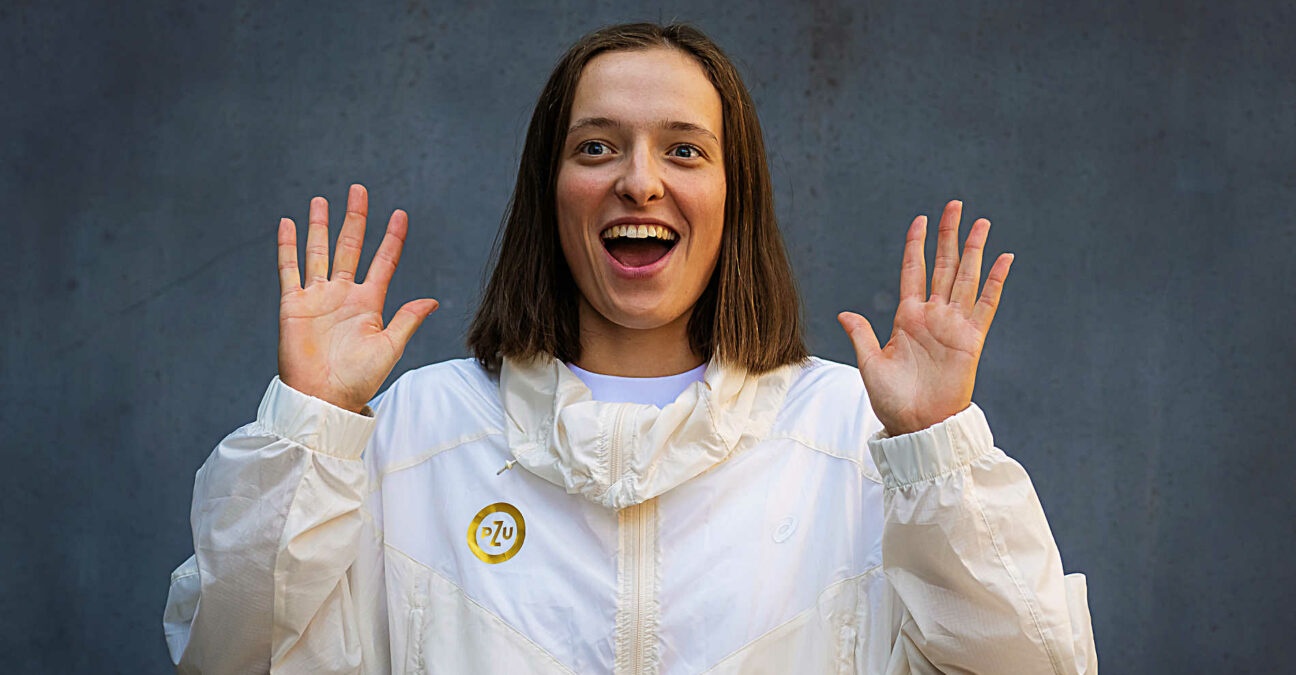 Iga Swiatek, 2022 | © Zuma / Panoramic
Iga Swiatek, 2022 | © Zuma / Panoramic
Iga Swiatek was the on-court blockbuster of 2022, winning two Grand Slam titles and going unbeaten from February to July in a 37-match winning streak that turned all heads. She stepped into the world No 1 position with incredible ease, owning all the duties of the job with defining courage on sensitive topics at only 21.
Swiatek has made being an introvert a successful trait in a sport that is usually the field of larger-than-life characters. And then while contemplating the scale of her domination, one also wonders how it translates into how she builds her brand off the court. Insiders are looking out for the brand endorsements, obviously comparing to past blueprints. But does Iga Swiatek wants to be a brand? Yes, she does. But the Iga way, as always. She and her team agreed to give us a closer look at how someone with such a unique personality finds a spot at the top of the business game while making sure not to get burnt along the way.
Each time a new super-dominant player comes on the scene, you can hear the business minds of the tour wondering how bankable they’re going to be. Everyone with any kind of financial interest in the sport worries about whether this person can sell: even more since the Big Four, the Williams sisters, the Sharapova and the Osaka eras have rained money on tennis.
Iga Swiatek has just landed in the centre of the tennis business talk. The sign? There’s been as much talk about the start of her season than about her move to IMG, her position at No 5 on the Forbes list of the world’s highest-paid female athletes with $14.9 million to her name ($5 million coming from off-court activities), and her sponsors’ announcements. The uniqueness of Iga Swiatek? There’s also been as much talk about her book club and her reading list. She has already carved a different path. “When I don’t have time to read a book, I know that I’m losing my work-life balance and I need to get back to basics,” she told Forbes.
One also needs to add that Swiatek has not felt comfortable in a social environment for that long, as she told the Players’ Tribune: “There was a time in my life I was so introverted that speaking to people was a real challenge. Until I was 17 or 18 it was hard sometimes to look people in the eyes. I hated how hard it was for me. It felt really bad not being able to make connections. My story isn’t like a lot of other athletes, and that’s okay.” And that’s the same person who has now become the face of the sport without missing a beat.
“Social media is my space and I like to be creative there” – Swiatek
Swiatek indeed also arrived at the right time, when her way of doing things resonates through a generation that, through her, feels seen. She has reached the 1 million followers mark on Instagram and so showed sponsors she could build a community. Here again, she does it her way and avoids the toxicity that can come along. “I like to be in touch with my fans on social media, especially on my Instagram. We don’t have a very strict plan of what to do there, I just follow my instinct and try to show people what I do on and off the court. I have some sponsors’ obligations but my partners are great and we’re always working on some posts that are valuable for my fans. Social media is my space and I like to be creative there. I like reading books so during my vacation I came up with an idea to create a reading challenge for my fans that I just announced and the feedback was amazing. I want to show people what I read and make some small reviews of books to motivate myself and others to read more. So this is my own, quite spontaneous way. I like to use my social media as a platform for my charity work too.”
Social media, the realm of the louder personalities, has yet also been check-marked by Swiatek, another example of how the Pole keeps finding ways to turn potentially hostile environments in her favour, and another very smart self-branding strategy. She’s not the first shy personality to rise to the top of the game but, contrary to someone like Ash Barty, Swiatek doesn’t give any reason to believe that she doesn’t care about building a powerful brand off the court. Quite the opposite, actually. And that’s where it’s about to get interesting for her and tennis because the Polish player is not looking at her very bankable rivals thinking “sure, they can have it, I’ll get the titles and be fine with it”. No, she’s looking at them thinking “I’m going to get my fair share of that pie, in my own way, thank you very much.”
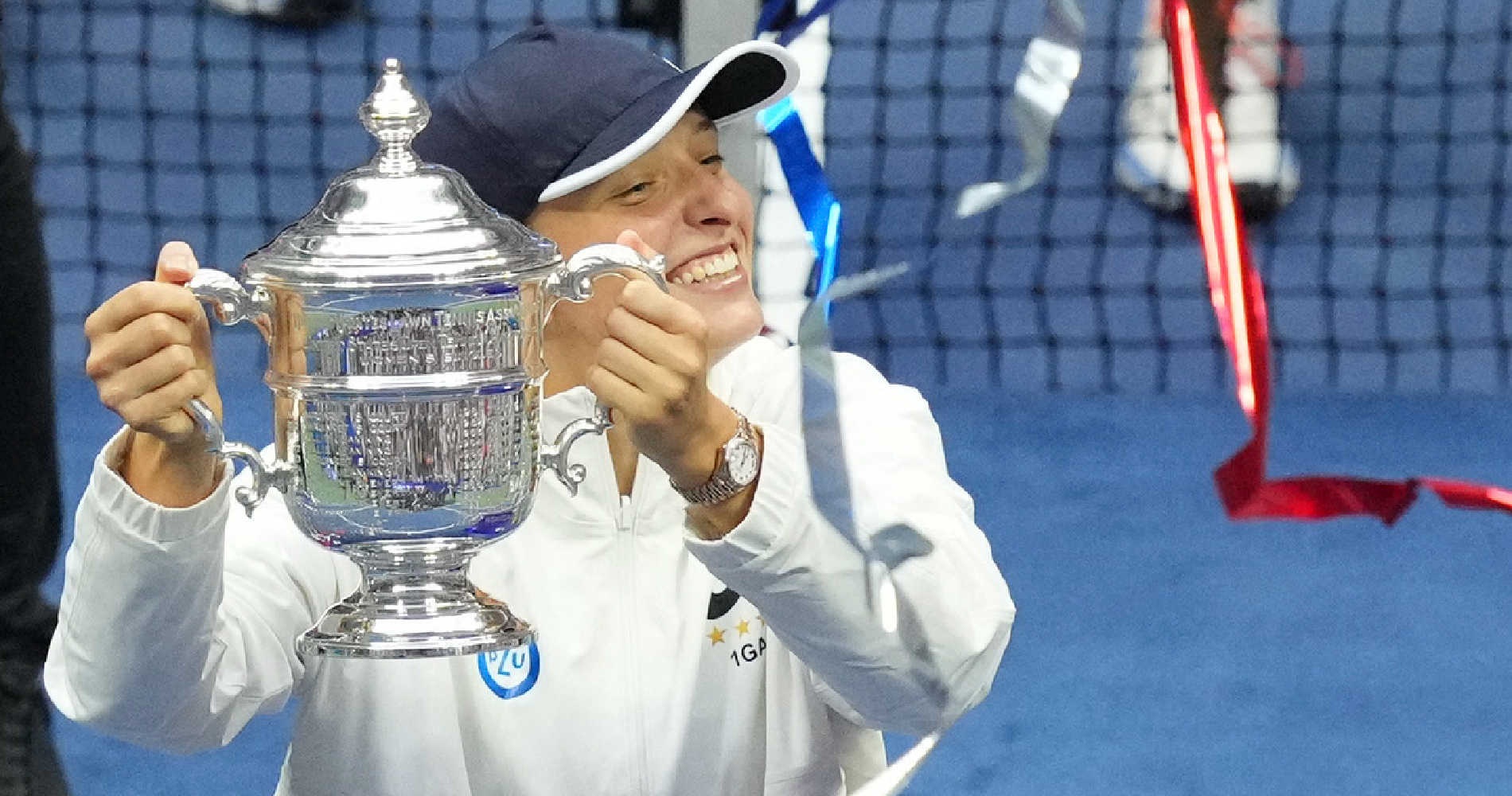
When asked to comment about that Forbes ranking, she didn’t beat around the bush: “I’m glad to see that ranking. Money isn’t my motivation but the tricky thing is I earned it really on the court and other players earned it mostly from endorsements so there’s a difference. I feel I can still expand my business a bit.”
Iga Swiatek is off to make sure that she won’t be put into the business corner. She may be quiet and an introvert, but she knows what she wants and how to plan to get it. That’s why, after the best season of her very young career, she came to her Polish management team and told them they needed to broaden their scope and so to find help to get there. Get where? Get global. Why? To get her voice heard when she feels it matters. And obviously, because she knows what’s up and that on-court and off-court leverage in that sport often go hand in hand: when you’re a household name off the court, there’s a chance your life on Tour is going to get much easier, that all the doors are going to open when you need them to. Again, she ain’t giving up her share of that pie.
“Business is my area of education now”- Swiatek
And so Iga Swiatek brought IMG into the mix to get to the next stage. She had a record-breaking and history-making 2022 season, so did she feel she should have got more out of it in terms of business? Swiatek doesn’t think so. Yet it seems she has decided it was time to turn that outstanding season into a launchpad.
“I decided to create my own solution in the area of my management in order to have a complementary team that supports my career,” Swiatek told us. “I’m working with IMG and I still have my Polish team where my PR manager is responsible for my communications globally and my partnership manager is taking care of my Polish deals. I’m from Poland and I currently have the biggest impact there and it’s important for me to use it well. IMG joined me to work on global business opportunities and I’m excited to see how it will support my career – this year we’ll have some exciting news. Their assistance is very valuable in everyday life on Tour too. They have a great team and resources to make my life so much easier and it helps me to focus on tennis.”
And so Max Eisenbud walked into the room. The Senior Vice President of IMG tennis and former agent of Maria Sharapova and Li Na, who is now also involved in Emma Raducanu’s rise to business stardom. If one man knows the path to build a lasting tennis player brand, it’s Eisenbud. When Swiatek announced she had joined IMG, that’s where all the tennis brains went: ‘Oh, she wants to get those deals now!”
Yet Eisenbud is fast to pour cold water on that narrative: “I don’t know if it’s necessarily like she has this big desire to become the highest-paid female athlete in the world. My perception is that she just wanted to make sure she’s got some really professional people around her in all aspects of her career, and she’s already done a really good job with that. Maybe I was the last piece of the puzzle to come in and make sure she had experts around her. What I think I’ve done a good job of over the years is listening to what my athletes wanted, and then trying to make them happy. I’ve been able to do that with some other great female tennis players. And hopefully, I’ll be able to do that for Iga.”
At her peak, she’s the best tennis player in the world, by a mile. No question about that. But, playing the devil’s advocate here, one wonders: can an introvert sell and get the big brand deals, will she have to work on her image, and should she get out of her comfort zone a bit? That’s the pressure coming from outside because surely when you get to the top of one of the most lucrative women’s sports in the world, you then have to turn into a superstar, no? No, that’s the Swiatek answer. She’s extremely clear on what her priorities are and has made sure that her whole team was aligned with them.
Her communications manager Paula Wolecka holds firm on what is the DNA of Swiatek’s brand. “She doesn’t need to be changed, so our role is to empower her true self. To give her the platform to be herself, and to promote her ideas and activities in order to increase her impact. We all as a team think about her career as a marathon, not a sprint. We have time to develop her image and her business step by step to not lose her authenticity, and to be able to engage her because her true involvement in projects is the most valuable asset to people, sponsors, and partners. People sometimes forget she’s only 21, but we don’t forget it.”
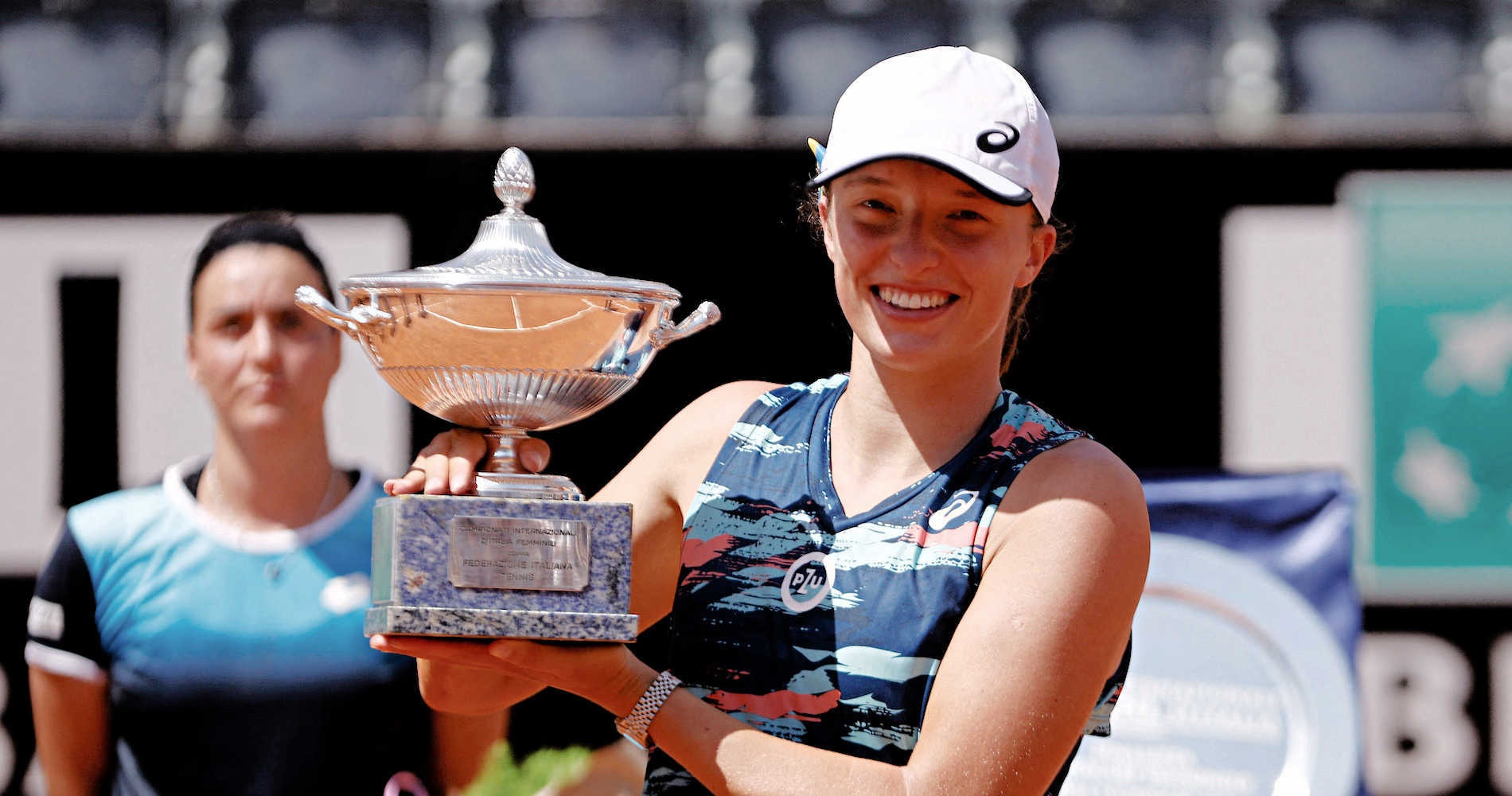
Swiatek will not change who she is to get the fame and the deals, she will instead change the unwritten rules about how to get it. “It was overwhelming at the beginning but I got used to it and now it’s a natural part of my career where my priority is my sport performance but I manage to develop my partnerships and business skills too. It’s not a secret that I can do it because I have a good team around me. Developing a business area is a fun and good challenge for me: I like it. I’m developing myself, I’m learning. A couple of years ago it was school, where I was learning. Now, it’s business, this is my area of education now.”
Daria Abramowicz, her sports psychologist who has a huge part in the day-to-day organization of Team Swiatek, confirms that education is the way of dealing with this new business world. “We have a lot of fun and development in terms of her learning about the law and economics, and because she likes to know things. So sometimes it helps because this is always stimulating and broadens the horizons. But on the other hand, obviously, sometimes it’s a lot of discussion about how much time you put into getting to know things. So how big the engagement is. The most important part is to understand how it works and what’s her path into all this. She has all the time in the world to get to understand and get to define what she wants from business.”
We all know examples of how wanting to be bankable and get the deals can come to ruin someone’s on-court career, whether because it’s too much of a distraction or too much pressure. So with Swiatek’s personality, one can wonder if there’s a risk here to throw too much at her in such a short time. It’s easy to forget when listening to her, that she’s still discovering the professional tennis world.
Abramowicz is confident that Swiatek will be fine because she’s been prepared for this, for finding her own way instead of panicking at the idea of being the face of a game previously dominated by someone like Serena Williams. “We’ve built this solid foundation, so now, there is no need to talk about the anxiety that is connected to stepping into someone else’s shoes, because she knows who she is. She’s in her own shoes, and she always will be. We try to create the most comfortable environment yet safe and obviously fulfilling her expectations.”
And indeed throughout all of 2022, never once did Swiatek look like she was overwhelmed or not at ease inside the storm. “That’s work,” stated Abramowicz. “And also we can’t forget her upbringing and how she was raised. With her moral code, values, and work ethic. And then setting up priorities, and understanding what makes a person happy. She defines what’s important for her and what she wants from her sport, and she wants that her voice matters. It’s less about the business itself, but more about having a platform.”
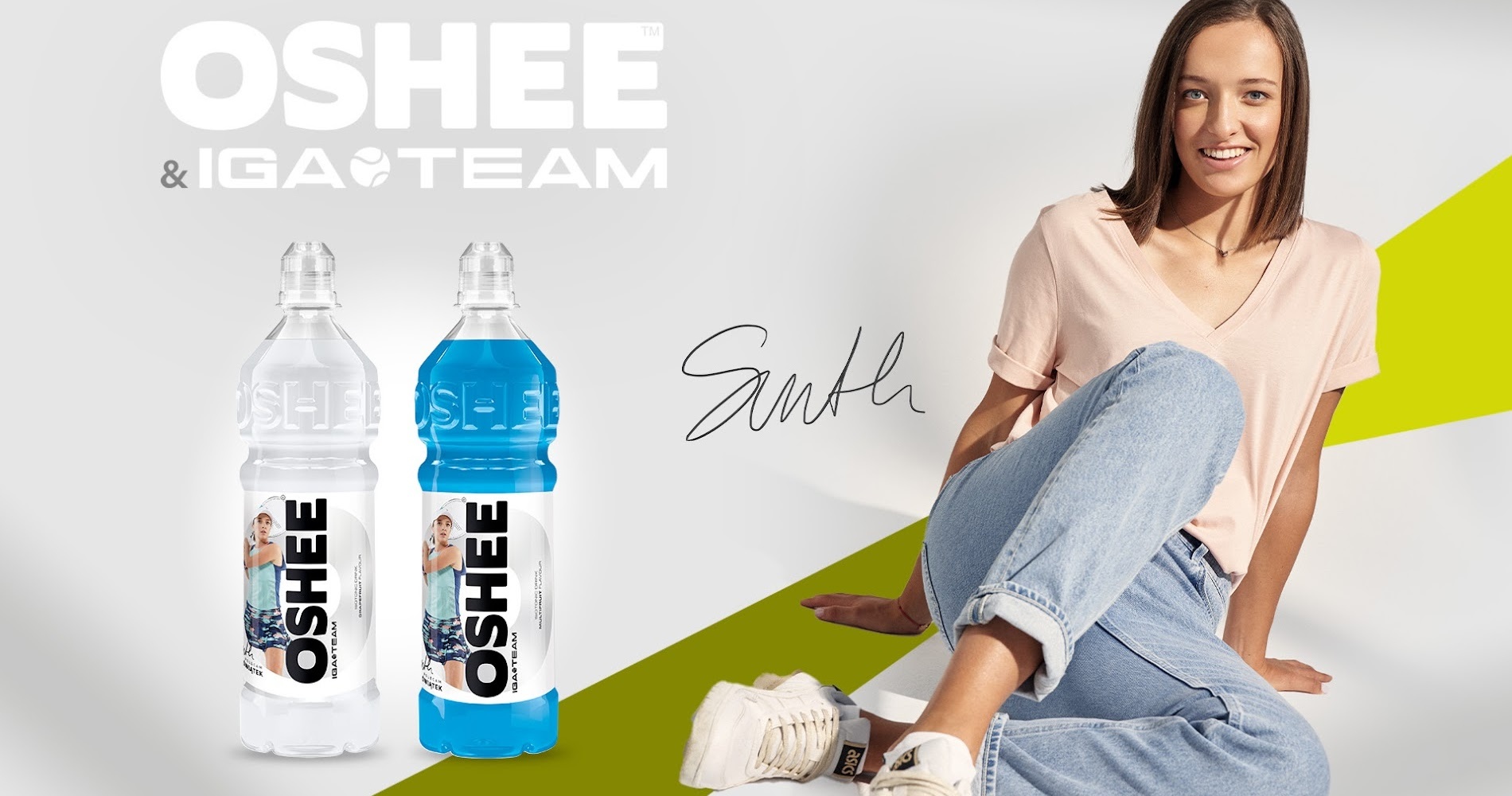
Swiatek is ready to make business moves because she has found a purpose in it and so can integrate it into her career goals in a healthy way. On Tuesday, it was announced that she had signed a global deal with Oshee, the market leader in functional beverages in Poland that has also made its way into foreign markets. “I chose a Polish brand because my goal is to support and promote my country,” said Swiatek about the deal. And so here is the sense that goes with the pay cheque and the time she’ll have to give them: helping Polish brands become global, and so trying to invalidate the bias that says that athletes from smaller countries, aka not from or not tied to the biggest European markets or to the UK and the US ones, will struggle to become global brands and crossover superstars. And so trying to break the vicious circle that sees brands not investing in those athletes.
“She defines what’s important for her and what she wants from her sport, and she wants that her voice matters” – Abramowicz
But Swiatek doesn’t stop there when it comes to putting sense into reaching for a bigger platform. Despite being focused on winning big, she also spent lots of her time in 2022 in supporting Ukraine after the Russian invasion. She wore the flag on her cap, she’d ask for support to Ukraine through her victory speech, she organised a charity event “Iga Swiatek and Friends for Ukraine” to collect more than half a million Euros for Ukrainian children: one million people watched the exhibition on TV and almost 15,000 at the arena. She got vocal about mental health, about violence against women in the sport. She took a stand for topics so many of her colleagues refused to touch.
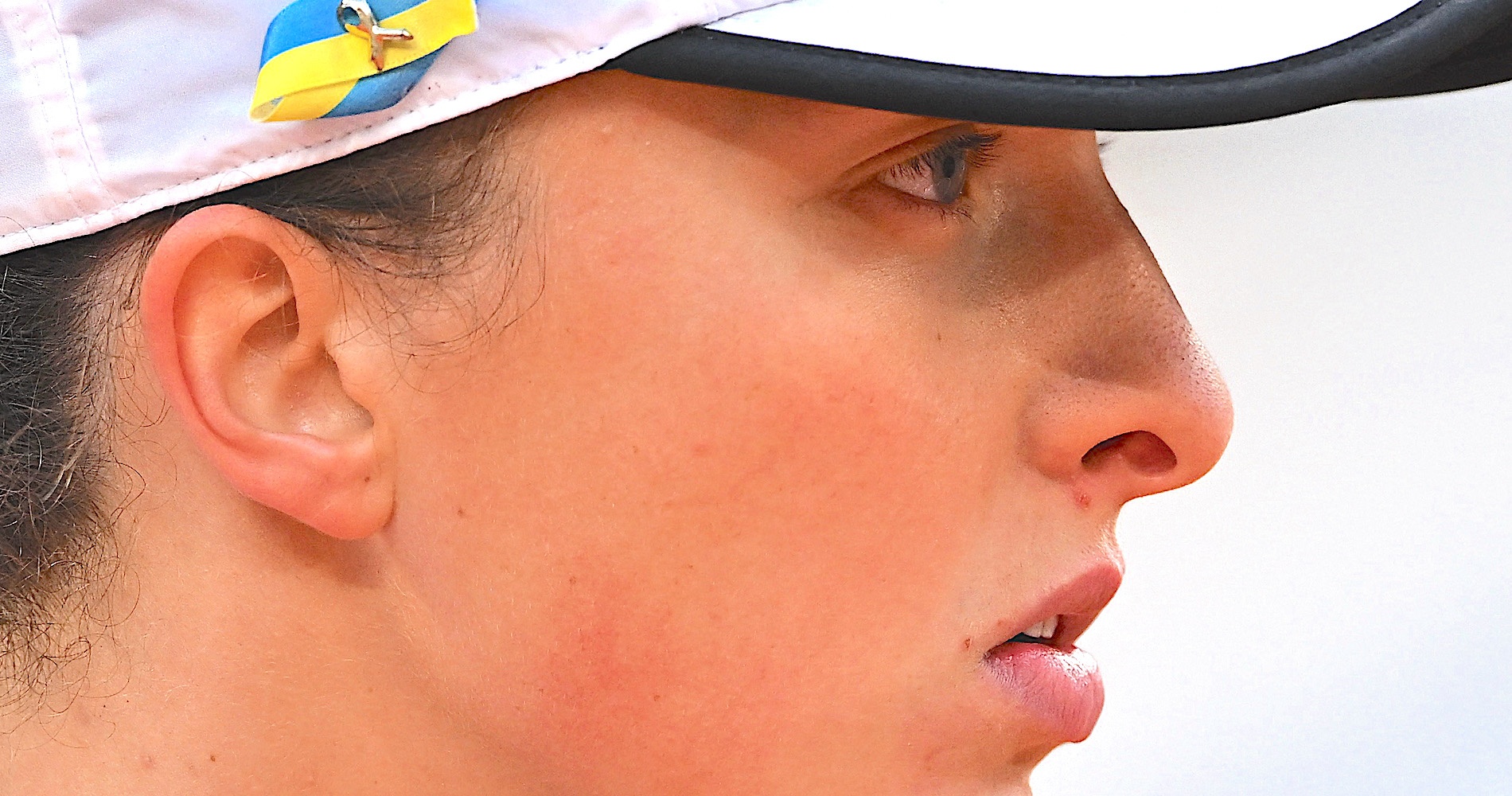
So being a big business name makes sense for Swiatek also because that’s going to help her make a difference and have a voice. Don’t call her an activist, though. “I don’t feel I’m an activist, to be honest. I’m a person who wants to use my impact well in a way that is healthy for me and fits my current possibilities. With Ukraine, it was a spontaneous decision because the news about the war was a big shock for me and I wanted to show my solidarity and then do more to help. Usually, I make decisions to support something important to me, like Ukraine or the area of mental health. Then I’ll talk to my team, and they’ll help me create my own way to support matters that are close to my heart. I can’t support everyone and everything, I give myself the right to decide what I want and what I don’t want to support.”
“I don’t feel I’m an activist” – Swiatek
Was Abramowicz scared while watching Swiatek putting herself on the line like that? No, because it comes with the Swiatek territory. “I always try to show her the perspective of assertiveness: you have the right to have a voice and to express your voice. But you also have the right not to express your voice if you don’t feel confident, secure, safe, or anything else. Athletes have to feel connected to a case or social matter, that’s the only way to be real in it and honest. And at the same time, I do think that there’s one thing that it’s worth considering with anyone in a leadership position: In the modern world, also, because of social media, these people’s voices matter. A sense of responsibility is something that you cannot escape from because it can give you perspective: being aware of what you say, responsible for what you say. And this is obviously something that we talk about a lot. Educating athletes and raising their awareness in that area, as in many others, is essential.”
Swiatek has picked her team well for her needs, not only on the court. Everyone speaks in one single voice and that voice is Swiatek’s. So when asked about what the strategy is now to grow Swiatek’s business globally, her partnership manager Alina Sikora proves to be on Swiatek’s rulebook too. What would be her ideal Swiatek brand? “Meaningful” is the answer that comes first.
“Big powerful brands should be involved in important social matters. There should be much more brands that would choose their ambassadors responsibly so it would increase brand social responsibility and awareness. Modern ambassadors are not heroes anymore who we would like to admire from far away, but people who deal with emotions, see problems around them, respond to other people’s needs, and encourage other people to help. I see Iga as this kind of ‘present hero’. Iga is always asking us to examine her potential partner. She emphasises the important role of corporate responsibility of the brand. There is no room for a partnership that is not comfortable, not aligned with her values and not inspiring for Iga as a person.”
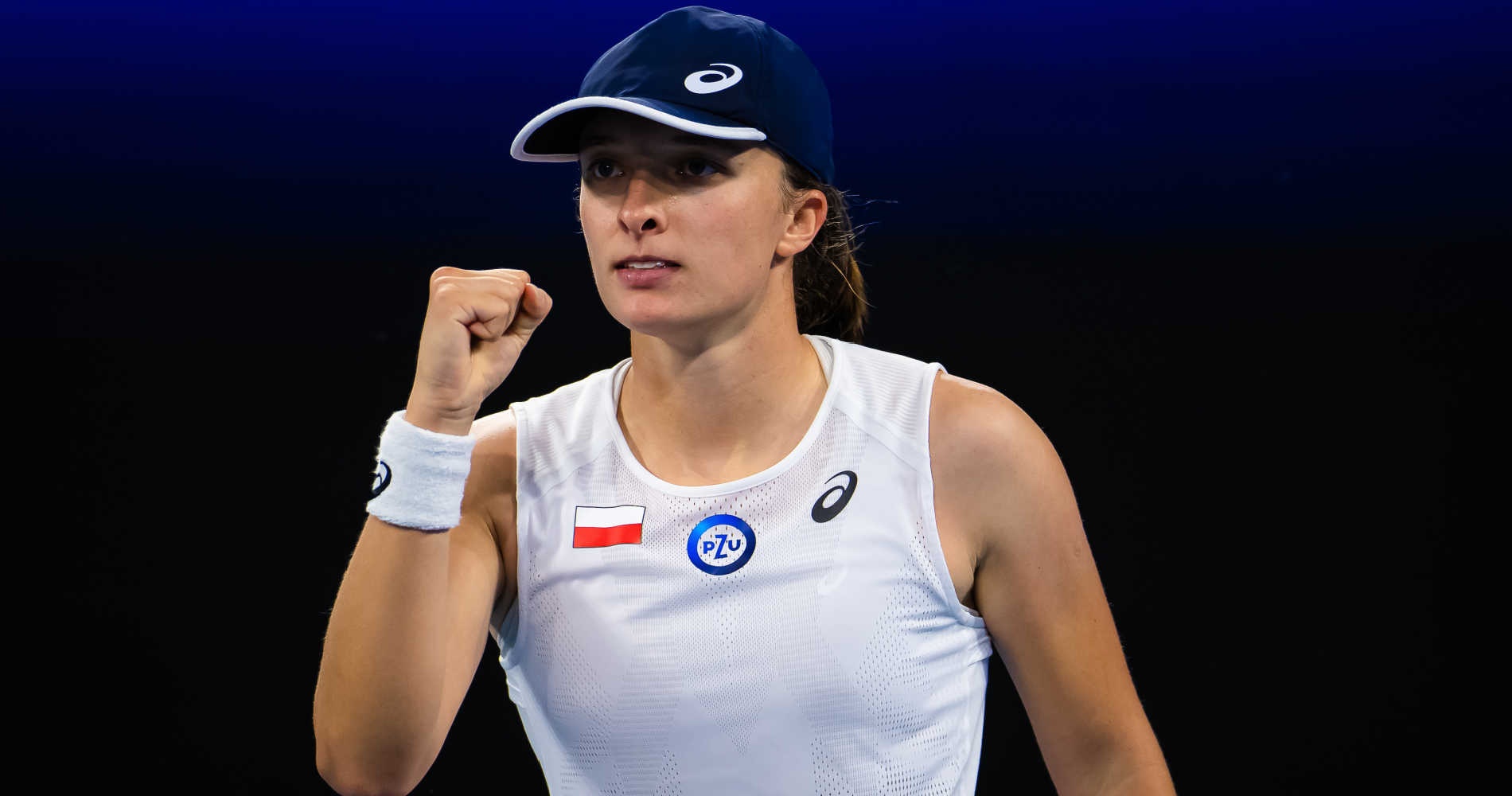
How does the market respond to Swiatek’s quiet but assertive way of doing things, to the fact that brands will often take the second spot in her priorities? Is the professional sports business, the usual playground of extroverted people, ready to bow down to an introvert? For now, Max Eisenbud has seen no sign of the contrary: Swiatek’s personality is more embraced than frowned upon.
“There are a lot of brands out there that want to be associated with her for many reasons. She’s got a lot of things to offer, besides being a great player and showing up consistently, week in and week out, which is something that we haven’t had in women’s tennis in a while. And that’s attractive to brands, obviously, but her unique personality and the fact that she’s very real and humble are also attractive to brands. On social media, she’s very good and very authentic and a lot of brands look at social. There are a lot of similarities to Sharapova: Maria wanted to win first, second, third, and fourth. Iga wants to win the same. And I think when you’re talking to brands, and you tell them ‘listen, you might not have as much time with her as maybe others because she’s so focused and wants to win’, usually the brands are excited about that. It’s just something you’re upfront with the brand. And nobody’s surprised when you talk to them like that.”
“I think she will keep it kind of small. I think that’s her personality” – Max Eisenbud
Still, her personality will dictate how IMG and the Polish side of Swiatek’s management will build her endorsement strategy. As for her presence in the media, as Paula Wolecka said,“less is more”.
“Iga did most of the job on the court. Her sports achievements and her authenticity during interactions on social media or with journalists generate great interest, results, reach, and coverage. I never had to ask for interest. Interest is bigger than we can cover at the moment, in Poland and all over the world. Globally, there is still work to be done to present Iga to wider audiences, that’s for sure, but it isn’t our goal itself.”
Eisenbud is still very upfront about it: don’t wait for Swiatek to sign dozen of deals and try to be everywhere. “I don’t think she’s looking to do 10 endorsement deals,” said Eisenbud. “I think she will keep it kind of small. I think that’s her personality. Her team has done a good job in the Polish market and, over time here, you’ll see us adding a couple, but I don’t think that she’ll be doing a lot of deals and that’s just by design. Certainly, you’re not going to see five, six, or seven deals announced at once. We’ll continue to be strategic, we’ll continue to be real, to go for things she’s excited about and just plot our way, so maybe it won’t be the typical Max size situation.”
“There is no room for a partnership that is not comfortable, not aligned with her values and not inspiring for Iga as a person” – Alina Sikora
For Eisenbud, no need to fill Swiatek’s schedule with business talks or events. Here also, less is more. “When Maria won Wimbledon in 2004, I figured out there were probably 16 to 17 days a year that she could use to shoot. That wouldn’t affect tennis meaning she’s never doing shoots during tournaments, before tournaments, right after tournaments, and spreading them out you have those 16 or 17 shoot dates that you can maximize your earnings. But I don’t see Iga having the desire to come anywhere close to 16 or 17 days. If something really makes sense, if something really matches up, and the values are the same, then we’ll pursue it. The mandate here is for me not to screw up everything that she’s doing.
“Great brand fit is what equals longevity, in deals. So if you’re doing a three-year deal, your hope is that you’re with that brand for 10 years. Sharapova and Evian were just that brand fit and they’ve been together for 12 years. Everyone is always thinking that you’re looking for the most money – and money’s important, don’t get me wrong – but the brand fit is something that I spent a lot of time and energy with because then you can have something special. So I think that’s what I’ll be focusing on.”
Swiatek is already one of the biggest names in her country and was named Polish Sports Personality of the Year, becoming the first tennis player to win since 1937. She has secured massive national endorsements with the likes of PZU (a Polish insurance company). She has also started successfully widening her appeal by inking a deal with Rolex. There are signs insiders are looking for to decide if you’re that big of a deal in tennis outside of your results, and the watch deal is on the shortlist. So was Team Swiatek proud and even reassured by this deal? “She was the first Polish athlete, male and female, to sign with Rolex so the pride was there, that’s for sure,” said Paula Wolecka, Swiatek’s communication manager. “It was maybe not a relief but a sign to the world that this girl has it and her potential was noticed by the greatest brands.”
“She was the first Polish athlete, male and female, to sign with Rolex so the pride was there”- Paula Wolecka, Swiatek’s communication manager
In two years, she has also become Asics most famous face and, with Daniil Medvedev, turned Tecnifibre into a racquet brand rockstar. So that’s the first answer on if Swiatek can sell inside tennis or not: yes, she can. Now what? Now can she sell outside of it? But for that, one needs to have the desire to be recognized everywhere, talked about everywhere and so judged everywhere. Paula Wolecka had that talk with her and appreciated her player’s honesty about it: “Iga is an athlete, she doesn’t consider herself a public figure yet and we respect that. She doesn’t know if she wants to be famous around the world. We give her time and space to develop and discover it at her own pace.”
At her own pace. Here’s the whole challenge for Swiatek, because tennis has been known for not caring that much about players’ personal pace and instead imposing its own with a mandatory “go big or go home” mentality. You’re getting up there among the stars of the game and the glitter that goes with being the best of the best and suddenly it’s like Hollywood: the photoshoots, the commercials, the sponsors’ campaigns, the red carpets, the influence battle, the gossips. Sure, you’re also playing tennis but now there’s a massive target on your back and a sea of people who demand a piece of you.

Sikora, her partnership manager, witnessed the change in Iga’s profile yet the team never lost track. “Iga’s business potential has been growing for the last three years constantly. Especially last year was a massive and significant change for us. She is in the spot of interest in the global market. So the first change was very simple and logical: the number of requests. The second one is the requests from the current sponsors who are already aware of how the partnership works: Suddenly on the table we get custom, brilliant ideas to develop! This is very comfortable for us and the player. Fortunately, I never had to explain to any sponsor Iga’s unique way of doing things. We all find ourselves in Iga’s world.”
“Fortunately, I never had to explain to any sponsor Iga’s unique way of doing things” – Sikora
That has to be the heart of the matter as it came back regularly through our talks about Swiatek’s business. Obviously very aware of the introverted nature of their player, the whole team has constantly an eye and an ear on Swiatek’s emotional pulse. Nothing that has a chance to disrupt her serenity or confidence will be attempted: If it ain’t broke, don’t fix it. She will not get pushed into new things for any other reason than herself demanding it. There is zero improvisation on that part of the system: everything starts and finishes with what Swiatek is comfortable doing or not. And it’s a constant watch, also when a conflict of interests appears between tennis and business in terms of time management.
“Interests are colliding, that’s true: sponsors want another PR day, sports team says no, that’s the reality,” says Daria Abramowicz. “And there needs to be a discussion held there where the player’s expectations and needs are always in the centre. Every new day there’s a new challenge, but we always try to find a common ground. There are a lot of discussions and our player is not involved in any of this. Because what she needs is a quiet and safe and secure environment to fulfill her priorities.”
It’s Iga first and everything else second as far as Abramowicz is concerned. “The first thing is that it needs to work for her. It needs to be very close to what she wants, and the job of everyone else that works around her is to bring her the best possible solution. It always has to be perfectly tailored for a particular person who is the core of everything.” So sometimes, the team will say no, even if when you’re at that level every no denies a massive opportunity.
“If you have your priorities straight, your identity defined, your self-esteem, and you are fully aware of what makes you happy and fulfilled, and you’re mindful about it: It doesn’t hurt,” explains Abramowicz. “You don’t feel that you’re sacrificing one for another. You need to be mindfully close to yourself, practising self-compassion when it’s needed.”
Swiatek won’t look into the Raducanu mirror
The strategy to build the Iga Swiatek brand seems clear. All heads seem to stay cool. Yet one can’t avoid thinking that it’s a lot of external pressure on Swiatek: not only do people expect her to go on dominating the Tour but now she’s also the commercial face of it. Where would be the risk then, if there was one tiny chink in the Swiatek armour? Well, as so often, she can name it herself: her perfectionism. She cannot stand to make any mistake on the court. She admits that she’s the same off the court: she has to clean the house until it’s perfect or she will not stop. “I’ve always struggled with feeling like I have to do everything exactly right all the time”, she told the Players’ Tribune. “I have to force myself sometimes to be proud of myself. But on the other hand, I know that the quality of having to do everything right is the thing that led me to this point in life, so it can be hard to work on it. And it can get really destructive.”
Then how does that translate with her business and especially with the endorsement side of it because, after all, it can be seen as a competition. Tennis players aren’t only competitive on the court: they also have a way to compare themselves to their peers off the court too. And so here you get to the elephant in the room: hasn’t Iga found it annoying to see the deluge of deals (Dior, Tiffany, Porsche, etc.) raining on Emma Raducanu? Isn’t it right in front of her eyes when she sees that Forbes ranking, where she’s in fifth position right behind Raducanu, also an IMG client? There is no comparison between the two players as far as results are concerned, yet in business terms, Raducanu did better. Everyone sees it, everyone raises an eyebrow about it. In the past, these kinds of considerations have added spice to some rivalries. Is it something that could enter Swiatek’s business brain: does she feel she also has to be the best there, to correct that stat?
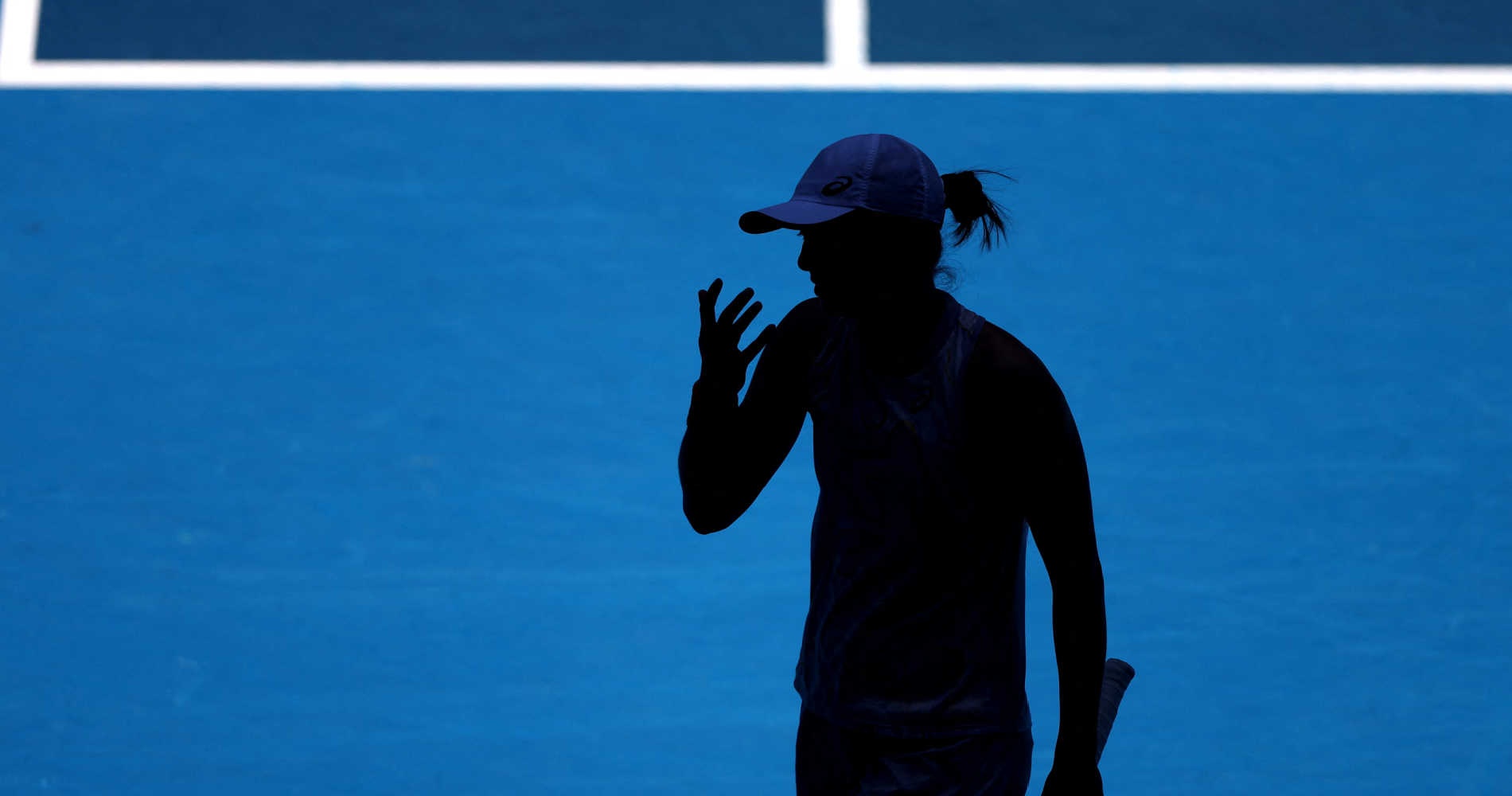
Absolutely not is the general answer of Team Swiatek, and Abramowicz is on Swiatek’s perfectionism case. “Comparing ourselves is one of the signs of perfectionism actually. Perfectionism is driven by this drilling voice in your head that is constantly asking, ‘What will others say? What will others do’. And it’s driven also by the threat of a shame kicking in: ‘we won’t do enough, or the same or better’. And it’s consuming and exhausting. One of the biggest areas and ideas of my work is that there is a huge difference between perfectionism and striving for excellence. Perfectionism can go away, and it goes away if you work on it. And what we want to achieve in our work with Iga is obviously to go towards striving for excellence and not putting energy into something you don’t have any control or influence on. At the same time, again: priorities and identity.”
“Sometimes the best solution is not giving a sh*t, honestly” – Swiatek
Swiatek, as often, had a very healthy way of summing it up in her Players’ Tribune piece: “Sometimes the best solution is not giving a sh*t, honestly. If there is some secret to my success in the last year, it’s giving myself that freedom to not care what people think.” Surely that’s also where she enjoys the advantages of being an introvert: she’s okay with not being under the spotlight all the time, and she’s okay with not being the only centre of attention.
They all say it’s lonely at the top but Swiatek last year seemed to be the first one, in a very long time, to look like she enjoyed it. Yet she comes into 2023 in a totally unknown territory of being the one expected to win everything again, to make history, to be the only face of the game. And for the first time, at the Australian Open, it seemed to be on her mind a bit after she lost in the fourth round against Elena Rybakina.
“I felt like I took a step back in terms of how I approach these tournaments, and I maybe wanted it a little bit too hard. I felt the pressure, and I felt that I don’t want to lose instead of I want to win. It’s going to be motivating for me, and I’m pretty sure that I’m going to play next tournaments with something to focus on, something to work on, and I think I’m going to go forward. So I’m going to try to chill out a little bit more. That’s all.”
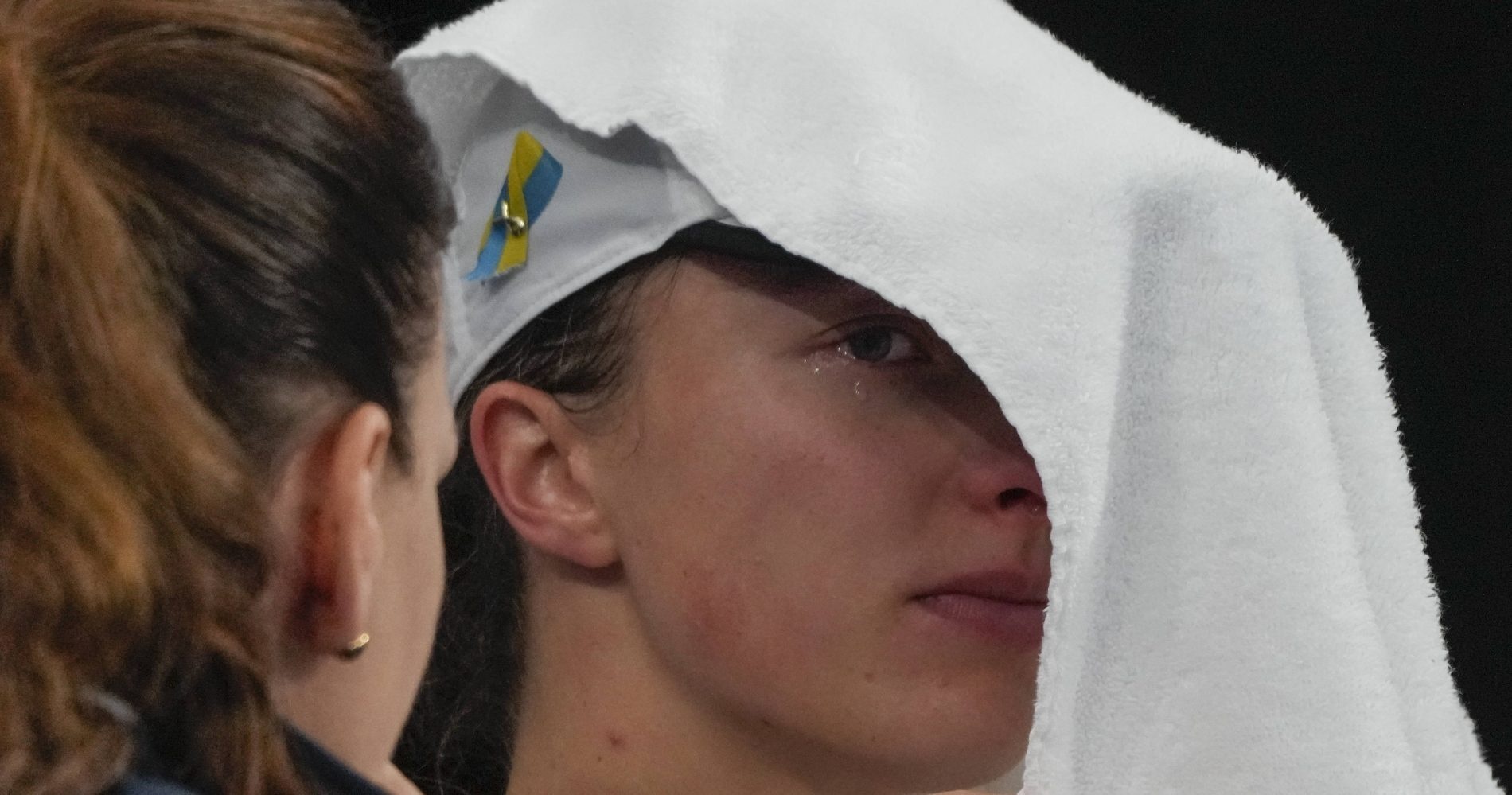
Anyone who becomes the face of tennis also becomes its business ambassador with duties coming with it: fill the seats in the stadiums, put people’s eyes in front of screens, make people buy the merchandise and the clothing lines, get kids to take a racquet, get your name (and thereby the sport) in the media, get the big brands involved. If one cannot do that, then whatever their results, they will not always see their on-court success translates into the brand building, exposure, and post-career opportunities that their resumé would deserve. Survival of the fittest, the professional sport off-court edition. Some athletes will care about it, others will shrug. Some are fine with being weirdly overlooked, some will keep asking why they don’t get this or that opportunity while their rival does. Some will have enough pragmatism or cynicism to get why they don’t get the extra VIP treatment.
“I don’t pretend to be someone else and this is my not-so-magic solution” – Swiatek
And some, like Iga Swiatek, will just look at the usual path and decide they prefer trying to create a new one, tailor-made for their own needs. You can be an introvert and still tell them all that it’s going to be your way or the highway.
“I’m just being myself, truly, and it works well because I can see people just appreciate my honesty, they know I’m authentic,” explained Swiatek. “I don’t pretend to be someone else and this is my not-so-magic solution. Maybe some people feel they are able to identify with me because they are introverts, too. Not everyone is an extravert, there is room for everyone.” If Swiatek succeeds in becoming a global brand, she will without a doubt change this sport’s rulebook for what star power means, and become an inspiring blueprint for many others.











